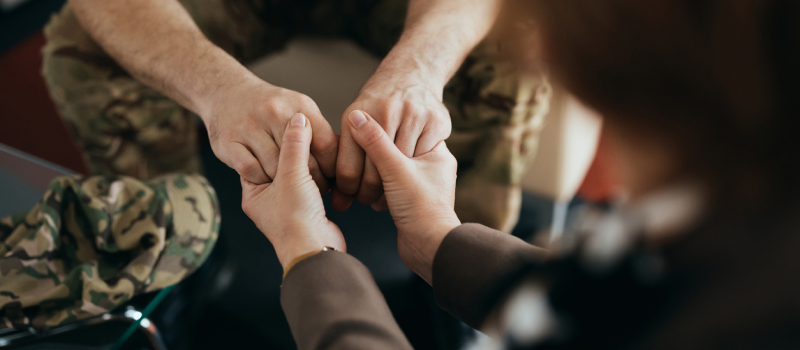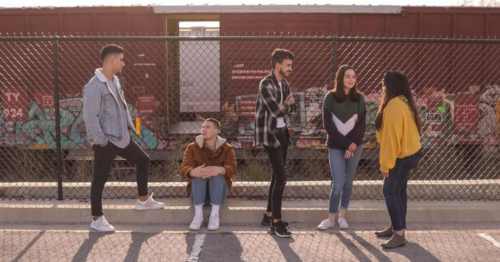
Table of Contents
Depression and Anxiety Among Veterans: Understanding the Symptoms and Seeking Help
Written By: Claire Szewczyk

Clinically Reviewed By: Dr. Don Gasparini
July 15, 2023
6 min.
About 1 in 3 veterans seeking treatment for health concerns are battling depression and anxiety, highlighting the need for mental health resources for veterans and military families.
Learn more about our Clinical Review Process
Table of Contents
In addition to their battles on the frontlines, veterans often confront silent battles within themselves: battles over their mental health. The rigors and traumatic experiences of having served can take a considerable toll on veterans, leaving them grappling with serious mental health conditions–most notably, depression and anxiety. According to the U.S. Department of Veterans Affairs, about 1 in 3 veterans seeking treatment for health concerns are concurrently battling depression and anxiety, underscoring the profound connection between military service and mental health.
It is crucial that veterans, and those close to them, understand the symptoms of depression and anxiety, and know how to seek mental health treatment for both conditions. This post highlights the causes of anxiety and depression among veterans and the disorders common symptoms. It also addresses the importance of early mental health intervention and discusses various treatments and veteran-specific mental health resources. Through knowledge and awareness, we can help support veterans struggling with anxiety and depression as they navigate their way toward recovery and improved mental well-being.

Transform your mental health from home
We support veterans and their families’ mental health.
Depression in the veteran community
Depression is a serious mood disorder characterized by persistent feelings of sadness, hopelessness, and a lack of interest or pleasure in activities. It’s more than just feeling “down” or “blue” for a couple of days. Instead, it is often prolonged and affects every facet of a person’s life, from their thoughts and feelings to their physical health and daily functioning.
For veterans, depression often co-occurs with other conditions like post-traumatic stress disorder (PTSD) or other physical health issues, creating a complex web of challenges that require comprehensive care and understanding.
Symptoms of depression in veterans
Symptoms of depression can manifest differently among individuals. However, there are some commonalities, which include:
- Persistent feelings of sadness and emptiness
- Loss of interest in activities once enjoyed
- Difficulty concentrating or making decisions
- Feelings of worthlessness or excessive guilt
- Changes in appetite or weight
- Disturbed sleeping patterns
- Physical symptoms like headaches and stomach aches
- Recurrent thoughts of death or suicide
It’s important to realize that everyone expresses these symptoms in their own way. For instance, someone might exhibit increased irritability, aggressive behavior, or unhealthy substance use. These behaviors may be their way of expressing emotional pain or dealing with feelings of numbness and despair.
Challenges veterans face with depression
Veterans often face unique challenges that contribute to a higher incidence of depression compared to the general population. These include things like exposure to combat, physical injuries or disabilities incurred during service, and the stress of transitioning from military to civilian life.
The experience of combat, and witnessing suffering and death can result in moral injury and guilt, which are potent triggers for depression. Physical injuries and disabilities can also lead to chronic pain and reduced quality of life, amplifying feelings of despair and hopelessness.
Finally, transitioning back to civilian life can also be a major stressor in and of itself. Veterans may find it hard to relate to people who haven’t shared their experiences or might feel lost without the structure and camaraderie the military provides. The sense of isolation and disconnection can exacerbate feelings of depression.
Do you need more support with
your mental health?
Charlie Health can help.
Anxiety in the veteran community
Anxiety disorders represent a group of mental health conditions often characterized by excessive fear, anxiety, or worry. These feelings go beyond what is considered ‘normal’ stress reactions and significantly impact a person’s daily living and quality of life. There are several types of anxiety disorders, including:
For veterans, anxiety can be a common response to the psychological stress experienced during service, often closely linked with other conditions like PTSD or depression.
Symptoms of anxiety in veterans
Anxiety symptoms can be both mental and physical in nature. Among veterans, they often manifest as:
- Persistent and excessive worry or fear
- Feeling edgy, restless, or jumpy
- Difficulty concentrating or mind going blank
- Irritability
- Muscle tension
- Sleep disturbances
- Panic attacks
Similarly to depression, veterans may often experience anxiety differently than members of the general public. Some veterans may show increased vigilance or hyperarousal—like they are constantly “on guard.” These symptoms may be accompanied by significant stress, exacerbating the challenges of transitioning back to civilian life or triggering memories or flashbacks of traumatic events.
Challenges veterans face with anxiety
Anxiety disorders in veterans are frequently associated with factors directly related to their time in service. The distress of warfare, life-threatening situations, or witnessing others’ injuries or death can lead to significant emotional distress. The development of PTSD is also common in veterans, which itself includes symptoms of heightened anxiety.
The process of transitioning from active duty to civilian life can also be an anxiety-provoking period of time for many veterans. The shift often involves significant changes in routine, lifestyle, and social connections, which can aggravate anxiety symptoms.
The stigma surrounding mental health issues in military culture also poses a barrier, preventing veterans from seeking help—leading to an escalation of anxiety and depression symptoms over time.

Seeking help for depression and anxiety
The early recognition and treatment of mental health disorders, like depression and anxiety, is incredibly important, especially among veterans. Left untreated, these conditions can lead to increased risks of substance misuse, physical health issues, relationship problems, employment difficulties, and severe cases, self-harm and suicide. However, with the right help and support, veterans can manage depression and anxiety conditions and lead fulfilling lives.
Depression and anxiety treatments available for veterans
A wide variety of treatment options are available for depression and anxiety, often involving a combination of psychotherapy (talk therapy), medication and lifestyle changes.
- Psychotherapy: Cognitive Behavioral Therapy (CBT) is a highly-effective treatment for these conditions, teaching veterans to understand and change thought patterns leading to harmful behaviors or feelings of distress.
- Medication: Antidepressants, anti-anxiety medications, and certain types of antipsychotic medications can also help manage these symptoms.
- Lifestyle changes: Regular physical activity, a balanced diet, adequate sleep, and reduced caffeine and alcohol intake can also help alleviate symptoms of depression and anxiety.
Veteran mental health resources
For veterans, there are many mental health resources available designed to help them with their specific needs. Some of the most common include:
- The U.S. Department of Veterans Affairs (VA) provides a variety of mental health services for veterans, including therapy and medication management.
- The VA also supports various specialized PTSD treatment programs, including cognitive processing therapy (CPT) and prolonged exposure (PE) therapy.
- Veteran-specific support groups can provide a safe space to share experiences and coping strategies.
- For immediate help, veterans can reach out to the Veterans Crisis Line.
Our veterans have made enormous sacrifices in the service of our country. Our collective responsibility is to ensure they receive the mental health support they deserve. By understanding the unique manifestations of depression and anxiety among veterans, recognizing some of the symptoms, and being aware of available resources, we can take significant strides in supporting their journey to recovery.
Remember–it takes strength to seek help. If you or a veteran you know is struggling with mental health concerns like depression or anxiety, reach out to a healthcare provider or a trusted person in your life. No one should have to walk alone, and help is only a phone call or a conversation away.
How Charlie Health can help military families
If you’re a veteran or military family member dealing with depression or anxiety, Charlie Health may be able to help. Charlie Health’s compassionate mental health professionals are here to listen to your story, understand your needs, and match you with an appropriate treatment plan.
Our personalized virtual Intensive Outpatient Program (IOP) offers mental health treatment for teens, young adults, and families who are dealing with a variety of mental health struggles, including depression and anxiety after service. Get started today.




